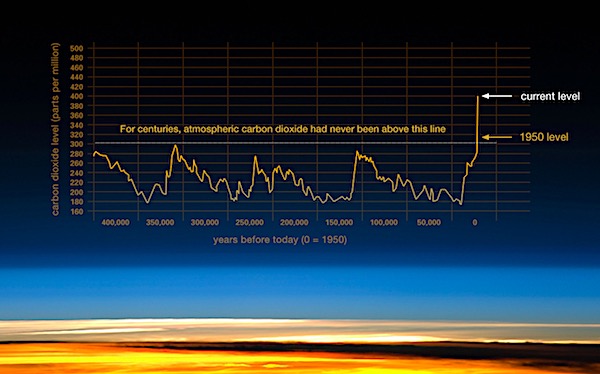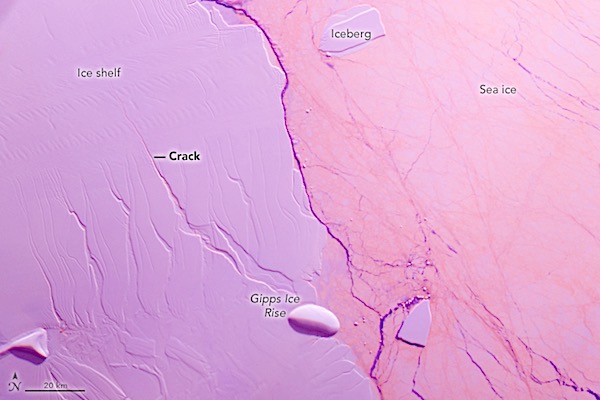
Wishful thinking won’t land a man on the moon, but it might get us all killed – fortunately, though, we have people who know how to nail a good landing.
All we have to do now is preserve the fruits of their labors.
Now that a climate denier is barreling towards the presidency, other climate deniers are coming out of the woodwork, but fortunately, NASA has a great site telling the story of climate change. For those who haven’t been keeping score at home, the too-simple story is that humans have pumped vast amounts of carbon dioxide in the atmosphere in the past few decades, amounts that in the geological record resulted in disastrous temperature changes – and it’s really convenient for a lot of people to deny that.
Now, don’t worry: NASA results are in the public record, so even though Trump’s team has threatened to blind NASA’s earth sciences program and looks poised to conduct a witch hunt of climate change workers in the Department of Energy, even though climate deniers are wringing their hands in glee at the thought of a politicized EPA attacking climate science, scientists are working to save this climate data. If you want to get involved, check out climatemirror.org.
Now, I said it’s a too-simple story, and there are a lot of good references on climate change, like Henson’s The Rough Guide to Climate Change. But, technically, that could be considered a polemic, and if you want to really dig deep, you need to go for a textbook instead, one presenting a broad overview of the science without pushing an agenda. For example, Understanding Weather and Climate has a great chapter (Chapter 16 in the 4th edition) that breaks down some of the science behind global climate change (human and not) and why anthropogenic climate change is both very tricky to study – and still very worrisome.
And because I am a scientist, and I am not afraid to consider warranted arguments on both sides of any scientific question, I also want to call out Human Impacts on Weather and Climate 2/e by Cotton and Pielke, which in Chapter 8 and the Epilogue take a more skeptical view of our predictive power. In their view, well-argued in my opinion, current climate models are sensitivity studies, not forecasts; they merely establish the vulnerability of our systems to forcing factors like excess carbon, and don’t take into account areas of natural variability which might seriously alter the outcomes. And, yes, they are worried about climate groupthink.
Yes, they’re climate skeptics. But no-one is burning them at the stake. No-one is shunning them at conferences. People like me who believe in climate change read their papers with interest (especially Pielke’s work, which while it in some ways makes CO2 less of an issue and in some ways makes other human impacts seem worse). Still, Cotton and Pielke think the right approach is “sustained, stable national funding at a high level” and decry the politicization of science in either direction.
Still, do worry. Earth’s climate looks intransitive – it can get shoved from one regime to another, like the rapid-cooling Heinrich events and rapid-warming Dansgaard Oeschger events in the geological record, possibly triggered by large-scale ice sheet breakdowns and ocean circulation changes. Yes, global warming can cause global cooling by shutting down the existing pattern of global ocean circulation – and we’re pumping enough carbon dioxide into the atmosphere to simulate past triggers for such events.
Do you see why people who study climate change in enough depth to see where the science is really not settled end up walking away more unsettled about the future of our planet, not less? And why we stand up and say NO when someone else comes forward saying the “science is not settled” while acting like the science has already been settled in their favor?

“Have fun warming the planet!” Just hope it doesn’t inundate Florida. I’d love to tell you that the projected 1M sea rise discussed in the Florida resource isn’t as bad as the Geology.com map’s default 6m projections, but unfortunately, sea level seems to be rising in Florida faster than the IPCC projections, and if the science isn’t really settled, we could have a sea level rise of … jeez. After reviewing some of the research I don’t even want to tell you. The “good” news is, hey, the seas might fall too.
“Have fun rolling the dice!”
-the Centaur